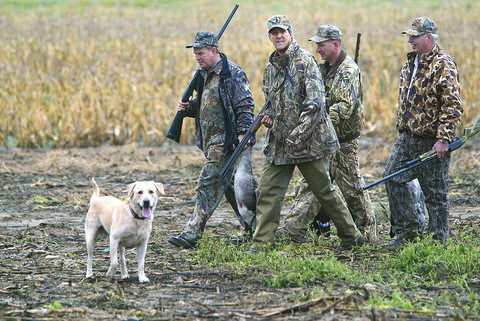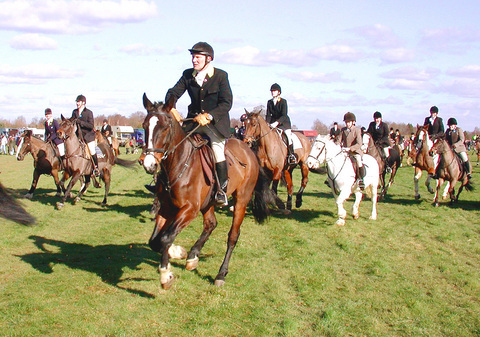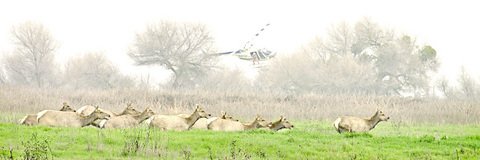Having long been a way for politicians to burnish their bonafides with rural voters, hunting is steadily morphing into a high-class pursuit for the wealthiest and well-connected, say local officials in this rugged brush land of South Texas where US Vice President Dick Cheney accidentally shot one of his hunting companions.
As the availability of public gamelands has shrunk, private outings to special preserves like the Armstrong Ranch, where Cheney accidentally fired his 28-gauge shotgun at Texas lawyer Harry Whittington earlier this month, are fast becoming the only way to share in one of the state's most fabled pastimes, many here complain.
So when local residents hear outsiders describe how big ranch hunts are typical for those who live in this part of Texas, many respond with a roll of the eyes. "If you don't know somebody who owns a big ranch or unless you're quite well off you don't get invited on these special hunts," said Chuck Shipley, 65, who runs the state's visitor center in Kingsville, 80km north on Route 77 of the Armstrong Ranch. "It's not like it used to be. It's pretty expensive to hunt in Texas."

PHOTO: NY TIMES NEWS SERVICE
But the cost means little to outside luminaries who gather at local ranches. Cheney was merely the latest in a stream of high rollers to hunt on one of the several massive ranches in the county, officials said.
"The big oil men, the chemical companies, all the bigwigs come down here to hunt," said Shipley. It's a far cry, he said, from the days when anyone with a rifle or shotgun could set out across the railroad tracks into the vast open spaces and hunt for deer, birds, and other varied wildlife found here.
Deep in the windswept plains of Kenedy County -- population about 400, with no restaurant or gas station in 2,253 square kilometers -- the Armstrong Ranch, like the nearby Kenedy and King ranches, has been host to presidents and princes.

PHOTO: NY TIMES NEWS SERVICE
Britain's Prince Charles once played a polo match on the 20,234 hectare spread in the Lower Rio Grande Valley between the Gulf of Mexico and the Mexican border. Both presidents Bush have been to the ranches here several times, according to locals.
Settled in 1882 by John Armstrong III, a lawman famed for capturing the outlaw John Wesley Hardin, it became the homestead for a powerful family that mixed rugged ranch life with Harvard and Yale educations and has been a fixture in Texas Republican politics for generations.
The founder's son, Tom, became one of the first executives for the Standard Oil Company in the early part of the 20th century. The late Tobin Armstrong, who died last fall, was a top fund-raiser for the Bush-Cheney reelection campaign, collecting more than US$100,000 in 2004.

There are an estimated 20 million active hunters in the US, according to industry groups. More than one million Texans alone apply for hunting licenses each year, according state wildlife figures.
And politics and hunting have long been inextricably linked here, as politicians have sought to embody the rugged individualism of the only state in the union that was once an independent republic.
"Hunting is deeply ingrained in our folklore and heritage," said Thomas Myers, a political science professor who teaches state government at Baylor University in Waco, Texas, and who grew up on a ranch. "Just like [former US president] Richard Nixon watched the Washington Redskins play football, here you go kill Bambi or some birds and you're part of one of the boys."
Former US president Lyndon B. Johnson was famous for driving his guests around his vast Texas ranch. US President George W. Bush, when he ran for governor in 1994, went hunting at the same event as his Democratic rival, then-governor Ann Richards, as each sought to burnish their credentials as average Texans.
Former US president Bill Clinton acknowledged in his memoirs that he believed Democrats lost to the Republicans in 2000 because they failed to appeal to hunters like Bush did. In 2004, both Bush and Democratic presidential nominee John Kerry devoted parts of their Web sites to hunters.
But hunting is no longer a surefire way to connect with blue-collar voters, say many in Texas. These days, the sport is more often associated with millionaires than backwoodsmen.
"In recent years there has been the sale of tens of millions of hectares of public lands for private mining and logging which is no longer accessible to the blue-collar hunter," said John Rosenthal, president and co-founder of the American Hunters and Shooters Association in Frederick, Maryland.
"The lack of access to public hunting lands is the number one reason that hunters drop out of the sport," added Bill Brassard of the National Shooting Sports Foundation in Newtown, Connecticut "There appears to be a trend toward pay-to-hunt operations."
On the King Ranch's 333,865 hectares, a one-day deer hunt costs at least US$1,000 per person, according to the ranch's Web site. Quail is US$450 per gun per day. A three-day outing could cost US$5,500 or more. In Sarita, the only town in county, where the elementary school for ranch workers' children and county offices are located, Diana Mata, the dispatcher for the Kenedy County Sheriff's Office, said she remains an avid deer hunter. But "unless you know someone on the property, it's not as easy to go hunting anymore."

Towering high above Taiwan’s capital city at 508 meters, Taipei 101 dominates the skyline. The earthquake-proof skyscraper of steel and glass has captured the imagination of professional rock climber Alex Honnold for more than a decade. Tomorrow morning, he will climb it in his signature free solo style — without ropes or protective equipment. And Netflix will broadcast it — live. The event’s announcement has drawn both excitement and trepidation, as well as some concerns over the ethical implications of attempting such a high-risk endeavor on live broadcast. Many have questioned Honnold’s desire to continues his free-solo climbs now that he’s a

As Taiwan’s second most populous city, Taichung looms large in the electoral map. Taiwanese political commentators describe it — along with neighboring Changhua County — as Taiwan’s “swing states” (搖擺州), which is a curious direct borrowing from American election terminology. In the early post-Martial Law era, Taichung was referred to as a “desert of democracy” because while the Democratic Progressive Party (DPP) was winning elections in the north and south, Taichung remained staunchly loyal to the Chinese Nationalist Party (KMT). That changed over time, but in both Changhua and Taichung, the DPP still suffers from a “one-term curse,” with the

Jan. 26 to Feb. 1 Nearly 90 years after it was last recorded, the Basay language was taught in a classroom for the first time in September last year. Over the following three months, students learned its sounds along with the customs and folktales of the Ketagalan people, who once spoke it across northern Taiwan. Although each Ketagalan settlement had its own language, Basay functioned as a common trade language. By the late 19th century, it had largely fallen out of daily use as speakers shifted to Hoklo (commonly known as Taiwanese), surviving only in fragments remembered by the elderly. In

Lines between cop and criminal get murky in Joe Carnahan’s The Rip, a crime thriller set across one foggy Miami night, starring Matt Damon and Ben Affleck. Damon and Affleck, of course, are so closely associated with Boston — most recently they produced the 2024 heist movie The Instigators there — that a detour to South Florida puts them, a little awkwardly, in an entirely different movie landscape. This is Miami Vice territory or Elmore Leonard Land, not Southie or The Town. In The Rip, they play Miami narcotics officers who come upon a cartel stash house that Lt. Dane Dumars (Damon)